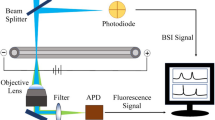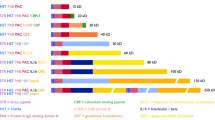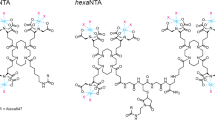Abstract
INTEREST in immuno-electrophoresis and its application both to research and in clinical pathology is rapidly increasing. I have developed a technique which is comparatively simple, reliable and very economical in the use of the anti-serum, which is still quite difficult to obtain. An additional advantage is the very distinct separation of the alpha-1 fraction, which usually is only poorly separated in agar electrophoresis. The electrophoretic pattern can be controlled according to requirements by adjusting the current time, buffer concentration and pH and the fluid levels in the buffer compartments.
This is a preview of subscription content, access via your institution
Access options
Subscribe to this journal
Receive 51 print issues and online access
$199.00 per year
only $3.90 per issue
Buy this article
- Purchase on Springer Link
- Instant access to full article PDF
Prices may be subject to local taxes which are calculated during checkout
Similar content being viewed by others
References
Grabar, P., and Williams, C. A., Biochim. Biophys. Acta, 17, 67 (1955).
Kohn, J., Biochem. J., 65/1, 9 (1957); Chim. Clin. Acta, 2, No. 4, 297 (1957).
Uriel, J., and Grabar, P., Ann. Inst. Pasteur, 90, 427 (1956).
Author information
Authors and Affiliations
Rights and permissions
About this article
Cite this article
KOHN, J. An Immuno-electrophoretic Technique. Nature 180, 986–987 (1957). https://doi.org/10.1038/180986a0
Issue Date:
DOI: https://doi.org/10.1038/180986a0
This article is cited by
-
The Laboratory Technology of Discrete Molecular Separation: The Historical Development of Gel Electrophoresis and the Material Epistemology of Biomolecular Science, 1945–1970
Journal of the History of Biology (2009)
-
Possible Explanation for Loss of Detectable Antibody in Patients with Disseminated Malignant Melanoma
Nature (1971)
-
Universal cuvette for electrophoresis
Bulletin of Experimental Biology and Medicine (1967)
-
Purification, Characterization and Immunochemical Properties of Human Chorionic Gonadotropin
Nature (1966)
-
A Rapid Technique for detecting Multiple Antigen–Antibody Precipitin Reactions
Nature (1965)
Comments
By submitting a comment you agree to abide by our Terms and Community Guidelines. If you find something abusive or that does not comply with our terms or guidelines please flag it as inappropriate.



